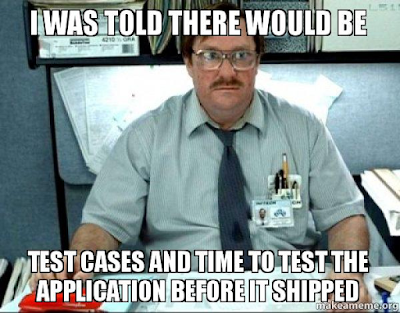How to Start a Career in Testing?
Lately, I've been seeing an increased interest in testing, so I figured I ought to share a few tips that help me get my foot into the door and get that first junior tester/QA role. I'll try to keep it short and concise, as much as I can.
Because that's why.
I first got into IT by getting a few certifications from Microsoft (I'll expand on this later), fixing PC and doing technical support shortly after that. My high school degree and college I was going to, at the time, were completely unrelated to IT - I finished art high school and I was studying history in college. I got my first QA role in a company where I had already spent roughly two and a half years working as a technical support agent, answering chats and emails, phone calls, helping out the customers over remote desktops, like TeamViewer - the usual support gig. The QA role I did at the time was strictly manual, not very demanding but I did have a nice time doing it, I had a great team, learned a few new things and perhaps the best part of it was I didn't have to deal with users directly any more. Customers always did like me, I've been told how patient and polite I am, but as a bit of an introvert, I found that I'm more effective when doing a job when I'm interacting with my team mostly.
Note: Working in support can kill your faith in humanity!
Of course, as there are many different branches of testing and various specializations, if you worked in a non-IT field, or if you're just looking for your first job, you'll need to aim for the low-hanging fruits - aim for those entry-level positions.
We all have to start from somewhere, but don't be this dude...
Instead, be Homer, you can never go wrong with that.
Below are five tips that can help you achieve this.
Getting a tech support job
Like I hinted above, getting an entry-level tech support type of a job can help you with getting that QA role a bit later on, usually in the same company after a year or two, approximately. Some of the skills you learn in support will carry over to a junior tester role, you will most likely have to support several web browsers, giving you a taste of cross-browser compatibility testing - in practice, this will mean you yelling obscenities about Internet explorer. You will also learn about ticketing, tracking bugs, maybe a bit about triaging issues - declining them or accepting the valid ones, also you will likely learn a thing or two about writing and using documentation. As you'll be exposed to the end-consumer you will develop an ability to see things from the user's perspective - this will help you become a more critical tester - anyone with two brain cells can cower "the happy path" test the software by using it as it was intended, but only a person who can think critically will try to test the program by doing something dumb (sorry for saying it so bluntly, that's the reality of it) because that what happens in the real world, people do stupid things all the time - we excel at it...
Deep down, we all are, it's just a matter of different levels.
Doing some Freelancing
By doing some freelancing and/or crowd testing, will give you some taste of what to expect and to know if you see your self as a future tester - and some basic experience, freelance gigs, and crowd testing platforms, for entry-level testers, usually have pretty straight forward requirements, you'll be tasked with finding obvious UI bugs and reporting them, checking mobile apps, usually in a form of a beta tester, checking the product from a customer perspective, before it can be released to the market - to be consumed by the real customers. You won't get rich doing this - these jobs have a very low barrier of entry and hence they don't pay very much, but, you will learn valuable things, such as writing test cases and reporting the issues you've found. Having any experience will give you an edge over many other candidates with no real-world experience, so don't be hesitant to leverage this in your favor.
I guess that's why it's called CROWD testing...
Learn to code, junior!
Even though entry-level tester roles will hardly ever require you to know much about programming, this will help you become a better tester, also, the QA industry is currently moving more and more towards test automation, so this will help you future-proof your job in the long run, as you're going to decrease your chances of becoming obsolete. Your ambition to learn to code, even when the job posting is not asking for that, will impress the hiring managers and you. For instance, knowing a bit about SQL queries can really help you in QA investigations, knowing some CSS can do you a lot of good in terms of understanding UI related issues, learning a thing or two about JavaScript can also help you with issues related to interactivity on the web, things like having an understating what characters as regular expression behind a password input field are asking for will make you a better tester.
Such miracles are possible!
Certifications
This is a topic that usually stirs up quite a bit of controversy, there are people who claim that certifications are nigh useless and the real-world experience trumps certificates any time - I tend to lean in this direction, partially, but (there's always a butt) having a certificate can help you stand out a bit in the sea of applicants with zero experience, it will make you more noticeable. Later on, certifications will more likely help you get a raise and such. My point is; don't try to get all the possible certifications and don't ignore them entirely, analyze your own needs and make a decision based on that. I know quite a few people who got their first tester/QA roles by getting the ISTQB Foundation Certification exam - it may be a bit dry theory and somewhat opinionated, it can be useful to you if you can afford the cost, as this one is a bit pricey.
Or something like that.
Understand the SDLC
Understanding the entire software development life cycle, this won't be a strict requirement for your first job, but it will be a nice perk to have on your first application. For instance, if you find out that the company you're applying to is using the Agile methodology, learning the basics about it will not only improve your chances in the hiring selection, but it will make your life easier. Context is very important in scenarios like this one, so comparing (for example) the difference between Agile and Waterfall will help you answer those questions such as: "Why do we use this approach instead of that one when developing software?". So read a few blogs on these topics before applying.
How it usually goes.
In summary, landing that the first job is always a challenge, so don't let your self get discouraged from trying if your first applications get rejected. I remember applying to almost 50 different openings before I got the job I wanted. Hopefully, some of the tips I've provided will prove helpful to future testers, thanks for reading and good luck!













I am doing qa certification course in software testing training. I found this blog useful, so much information in this blog. Thank you for sharing this blog.
ReplyDeleteHi Anna, I'm glad you like the blog! If you're learning test automation I'd recommend the Test Automation University: https://testautomationu.applitools.com/ They got a lot of great courses and they're all free!
DeleteI am really impressed with the way you have written the blog Thank you so much for sharing the valuable post, I appreciate your hard work. Keep blogging. I have some reference related to BA in one year for more information contact us .
DeleteHello Mirza, thank you for your recommendation I have already enrolled into QA training course and learning the same. But I appreciate your recommendation I will recommend it to my friends who is interested in same. Have a great day! :)
ReplyDelete